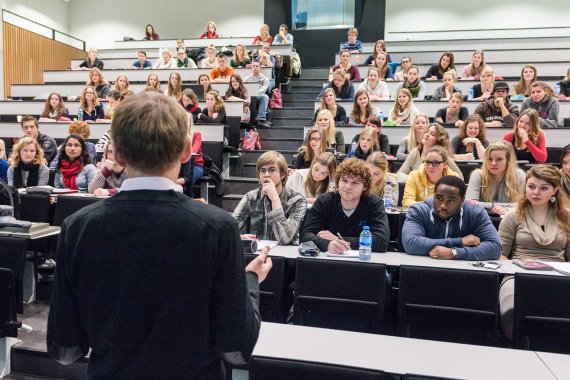text Linda van der Nat and Albert Sikkema photo Guy Ackermans
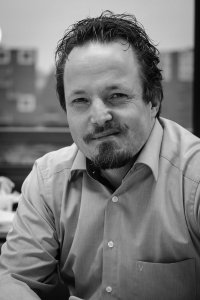
Perry den Brok
, professor of Education and Competency Studies‘The interaction between education and research at the university is very important, because they reinforce each other. So I am not in favour of a career path with only teaching or only research. But it is good to give staff the option of specializing in teaching, so that you can even become a teaching professor. There is already a basic teaching qualification (BKO) for lecturers, but there is nothing after that. Some universities have already created a senior teaching qualification (SKO). You get that if you are an exceptionally good teacher, if you stand out for curriculum development, or if you are innovative in the area of testing, practicals or ICT. I think you need these kinds of criteria for testing teaching quality in your HR policy. I see this kind of career path as a way of rewarding different kinds of talent in your organization.’
Carlijn Wentink, lecturer and education coordinator in Health and Society
‘The career path for teachers is a nice first step by the university to show that they think good teaching is important. But there has to be a cultural change as well. We could do with a bit more appreciation of education and a career path won’t change that by itself. The way it’s seen at the moment is that if you are a good researcher, you just do some teaching on the side. But teaching really is a profession that you can be good at or bad at. If the university wants to show that it sets store by good teaching, there will need to be more scope for professionalization as a teacher, going beyond the basic qualification (BKO). I am in favour of maintaining the link between teaching and research. We are training young researchers, so as a teacher you need to have your feet on the ground too. But we don’t all have to be outstanding researchers.’

Ivonne Rietjens
, professor of Toxicology ‘I think it’s a very good thing that they re-evaluate the tenure track. I’ve already lost two members of staff who found it too onerous and opted for a job elsewhere. I would have liked to appoint them as assistant or associate professors, but that wasn’t possible in recent years. I now have new tenure-trackers, but with the current criteria I can’t make them do all the additional teaching that is a consequence of rising student numbers. As a result I am teaching a lot myself now. So I would very much like to be able to appoint a new associate professor. I wouldn’t want the emphasis in tenure track to lie on teaching. That would be going too far. People teaching on the Master’s, especially, must stay in touch with research. I am in favour of the possibility of appointing assistant or associate professors with an old-fashioned ratio of 40 percent teaching, 40 percent research and 20 percent social responsibilities.’
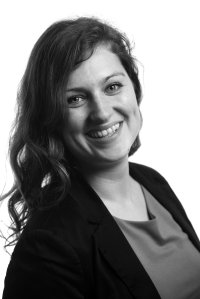
Tjitske Geertsema
, PhD candidate in Hydrology and Quantitative Water Management, and member of the WUR Council‘I see it as a positive development that more career possibilities are created for teachers. The most important competency for this group, in my view, is not educational innovation but didactic quality. Teachers who know how to motivate and inspire their students. In our sciences group it is the people with light research loads who turn up every year in the Teacher of the Year long list. People like Roel Dijksma, Gert Peek and Paul Torfs. Teachers to the bone. Some of them will be retiring soon and will be replaced by tenure-trackers with a lighter teaching load. I expect that to lead to a fall in the quality of teaching. The most important question for the WUR Council is: what exactly will the research load be in the teaching career path? Personally I think there should still be a strong link with research, because that is Wageningen’s strong point. The discussion hasn’t got going yet in the WUR Council, but I don’t sense any strong opposition.’
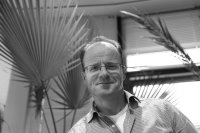
Erwin Bulte
, professor of Development Economics‘I’m in favour of more flexibility, especially in the initial phase of tenure track. I see around me that the acquisition demands create a lot of stress. People sometimes take on research that is far from their own research field, just to have projects. More scope for shifting between education, research and acquisition is something I applaud. I’ve got four tenure-trackers in my group. We don’t have too much teaching available, in fact we need courses, but I recognize the problem of rising student numbers in other groups. I think we should always have a combination of teaching and research in tenure track, otherwise you run the risk of turning into an applied sciences university. I also think we should assess tenure-trackers less on the spreadsheet with the grades that were achieved, and more on the content of their research. Then you need more external expertise to be able to assess them properly.’
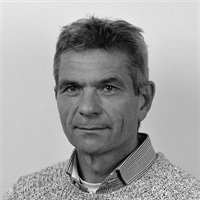
Frits Claassen
, associate Professor of Operational Research and Logistics, and Teacher of the Year 2012‘In itself I think it’s a good think the university is starting to appreciate the importance of education more precisely Adding a teaching career path offers staff a wider range of possibilities, a prospect they didn’t have before. At the same time I wonder whether any young members of staff will opt for a teaching career. Surely every staff member wants to do research, especially ambitious young scientists. A minority will block the possibility to go on to a personal chair early on. That is logical, that is why they are working at a university. So tenure-trackers will want to invest a lot of time and effort in looking for funding and writing project proposals. The competition for grants and research funding is enormous, however. If you ask me, the problem with tenure track is not the teaching load but the financial feasibility and the pressure of acquisition. Even without rising student numbers, the current system is not tenable in the long run.’

